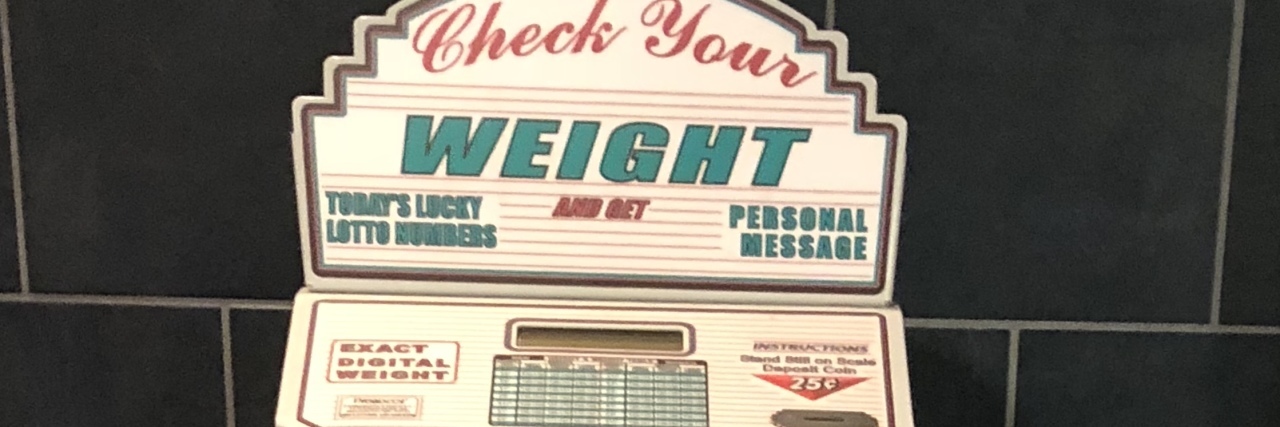The Unexpected Place I Found a Scale
Editor's Note
If you live with an eating disorder, the following post could be potentially triggering. You can contact the Crisis Text Line by texting “NEDA” to 741741.
During a recent trip to the movies, I was exiting the restroom when I spotted a scale leaning against the wall. It was one of those scales where you insert 50 cents, input your height and age, and a little slip of paper comes out of the side with the results. While I was used to seeing scales like this in vitamin stores and rest stations, I was taken aback. A scale in a movie theater? Is this really what our culture has come to?
While I’m sure there were many people who walked past that scale without giving it a second thought, this seemingly innocuous object put a pit in my stomach. As someone who has struggled with an eating disorder, the sight of the scale brought up a lot of emotions. I could remember standing on scales just like this one, praying the number would be lower. My mood was often determined by that little slip of paper; I either felt triumph and accomplishment or disappointment and frustration. My life revolved around weighing myself multiple times a day, and I had very little time or energy for anything else.
While the scale no longer has that power over me, it took a lot of work to get there. Not only was I fighting my own urges to step on the scale, but also society’s constant pressure to lose weight. Even for those who do not struggle with eating disorders, the presence of a scale is problematic. Weight stigma and the pressures to make yourself smaller is continually pushed onto us by advertisers, social media and so on. The fact that a scale, which is technically a medical device, is being placed in recreational places is indicative of how weight has become a form of entertainment. As a culture, we are preoccupied with shows that focus on weight loss. We are constantly labeling weight loss as good and weight gain as bad. The simplification of weight as being indicative of health is incredibly problematic. Those in bigger bodies often face fat stigma and inadequate medical care. Further, the overemphasis can often act as a maladaptive coping skill and prevent people (like me) from dealing with their feelings.
What would happen if we did not weigh ourselves? What if we judged our health by how we felt, both physically and emotionally? What if we didn’t use the scale to help us feel successful, but instead, we focused on our jobs, our hobbies or our relationships? Think of the mental space we would have. Admittedly, it can be incredibly difficult to get in touch with our bodies, especially after spending so long not listening. With lots of time and practice, it is possible.
Now, this is not to say there should be no scales at all. For example, doctors will often use a person’s weight in order to determine medication dosages. Still, as individuals living our daily lives, we do not need to be preoccupied with a number that merely measures our relationship to gravity. Further, it’s a number that shifts depending time of day, water level, hormones and so on. It is a number that can always be trusted. It also cheats you out of really listening to your body. When we begin to shut out the noise of the scale, we are better able to hear our bodies speak.
Without a doubt, our culture’s current preoccupation with weight has to stop. Not only is it perpetuating harmful messages about weight stigma, but it is cheating us out of truly living our lives. One way to stop this is by taking scales out of spaces like malls and movie theaters. Will this solve the bigger problems? No, but it’s a step in the right decision.
Everyone, no matter their age or gender, weight or body type, should be able to go to the movies without thoughts of their weight.
So, go ahead — watch a movie, enjoy a yummy snack and live your life. Everybody is deserving of that.
Image via contributor.

